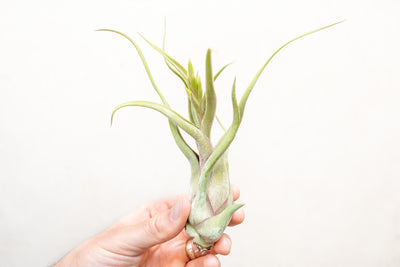
Tillandsia Safari: Parque Nacional Río Dulce, Guatemala

Situated on the Caribbean coast of Guatemala, between Belize to the north and Honduras to the south, Río Dulce National Park is a fantastic place to see some of our favorite tillandsia species! The park includes a large fresh river system flowing from Lake Izabal, through a narrower channel, Río Dulce, to El Golfete (or the little golf) before emptying into the Caribbean Sea. Various lowland tropical species of trees, birds, animals and epiphytes flourish along the muddy banks, inlets and natural canals of the slow-moving river basin.
The climate is hot and humid, with only a subtle decrease in afternoon thunderstorm activity during the dry season from November to April. The Tillandsia species found here do not mind getting wet, in fact, many species are found within feet of the water, hanging on the lowest branches or even attached to the the upper parts of the stilt roots of the giant mangroves. The most visible species are Tillandsia Streptophylla, Tillandsia Bulbosa (the same as the Belize form), Tillandsia Balbisiana, Tillandsia Juncifolia and Tillandsia Brachycaulos. These air plants live among other large tree-dwelling bromeliads, tillandsias, orchids, ferns and epyptic cacti.
Due to the wet topography, the best way to explore Río Dulce is by boat –– either motorized or muscle-powered! Our eco lodge provided a set of ocean kayaks for guests to explore the area and they proved a great way to see all of the local flora and fauna, including the native air plants. 💪 Normally we would spot one or two plants at eye-level before looking higher and seeing other groupings of the same species nearby! The way that the seeds spread is always apparent in natural settings as clusters or families of plants seem to populate their own "neighborhood".
As we moved through the jungle canals, we observed the striking boundaries between a location that seemed covered in a particular species and where another species becomes prominent (for example, a transition from Streptophylla-domiance to Balbisiana-dominance within a short distance). This shows that just minor differences in environmental factors like host tree type and height, sunlight, or humidity can make a more ideal climate for a particular species to dominate. You find yourself saying things like "Wow, the Bulbosa really like this opening in the trees!"
While visiting our nurseries and seeing the mass cultivation of plants is magical in its own way, seeing the plants thriving in their natural habitat is what will continue to keep us enchanted with these unique and beautiful plants for years to come!
Enjoy our personal photo journal of Tillandsia sightings below!

An extra large Tillandsia Streptophylla clump with spent blooms and tons of fluffy seeds. This was our most exciting discovery of the trip!

Another shot of a smaller Tillandsia Streptophylla with a hand for scale.

We saw many sizes of beautiful, curly Tillandsia Balbisiana. This was our most surprising variety of air plant to find in Río Dulce.

Another photo of Tillandsia Balbisiana. When Tillandsia are high in the trees, they're hard to photograph in any detail. However, very interesting to see their size and shape in this image.

A stunning clump of Tillandsia Bulbosa Belize with a lipstick pink bloom. These were absolutely stunning hanging so low and close to the water.

Had to get a shot with the Bulbosa!

























Leave a comment